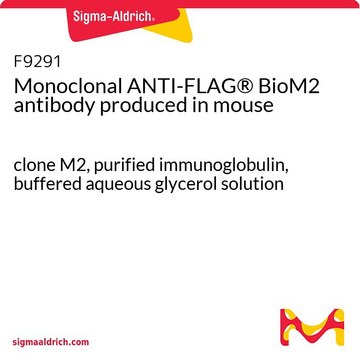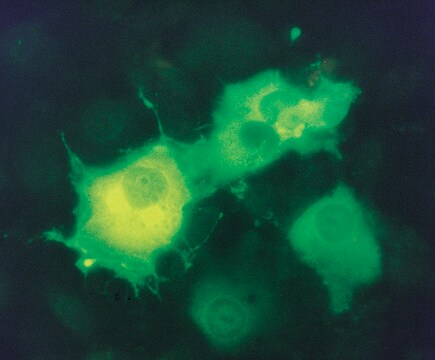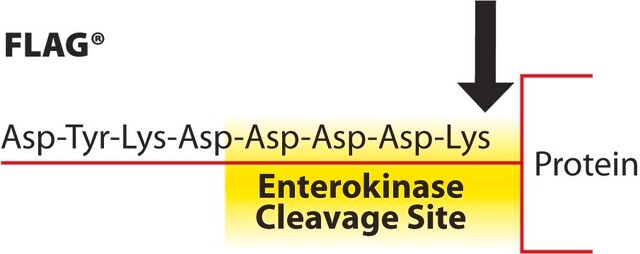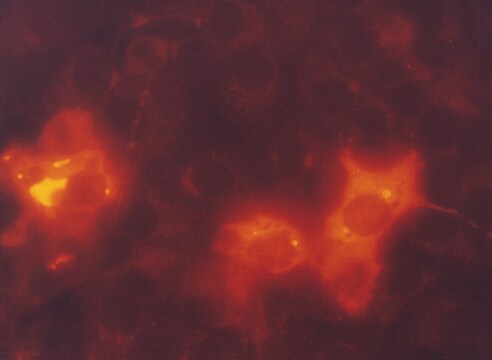B3111
ANTI-FLAG® M2 antibody, Mouse monoclonal
Clone M2, purified from hybridoma cell culture in bioreactor
Sinônimo(s):
Anti-ddddk, Anti-dykddddk, M2 clone ANTI-FLAG
Faça loginpara ver os preços organizacionais e de contrato
About This Item
Código UNSPSC:
12352203
NACRES:
NA.43
Produtos recomendados
fonte biológica
mouse
forma do anticorpo
purified immunoglobulin (purified IgG1 subclass)
clone
M2, monoclonal
prazo de validade
4 yr
purificado por
using Protein A
temperatura de armazenamento
−20°C
Descrição geral
Monoclonal ANTI-FLAG M2 is a purified immunoglobulin, IgG1, monoclonal antibody, purified from culture supernatant of hybridoma cells, that binds to FLAG® fusion proteins. Unlike ANTI-FLAG M1 antibody, the M2 antibody will recognize the FLAG sequence at the N-terminus, Met-N-terminus, C-terminus, or at an internal site of FLAG fusion proteins. Monoclonal ANTI-FLAG M2 is useful for identification and capture of FLAG fusion proteins by common immunological procedures such as Western blots and immunoprecipitation. It is also useful for affinity purification of FLAG fusion proteins when bound to a solid support.
form: solution pH 7.4, containing 15 mM sodium azide
concentration: 3.0-5.0 mg/mL
form: solution pH 7.4, containing 15 mM sodium azide
concentration: 3.0-5.0 mg/mL
Aplicação
IB, IF, IP, FACS, ELISA
Antibody is recommended for use in several applications such as immunoblotting, immunoprecipitation, immunofluorescence, flow cytometry, and ELISA.
Learn more product details in our FLAG® application portal.
Antibody is recommended for use in several applications such as immunoblotting, immunoprecipitation, immunofluorescence, flow cytometry, and ELISA.
Learn more product details in our FLAG® application portal.
Embalagem
polypropylene screw cap vial
Nota de preparo
Dilute the antibody solution from 0.5-10 ug/mL in specified buffer
Informações legais
ANTI-FLAG is a registered trademark of Merck KGaA, Darmstadt, Germany
FLAG is a registered trademark of Merck KGaA, Darmstadt, Germany
Código de classe de armazenamento
12 - Non Combustible Liquids
Classe de risco de água (WGK)
nwg
Ponto de fulgor (°F)
Not applicable
Ponto de fulgor (°C)
Not applicable
Escolha uma das versões mais recentes:
Certificados de análise (COA)
Lot/Batch Number
It looks like we've run into a problem, but you can still download Certificates of Analysis from our Documentos section.
Se precisar de ajuda, entre em contato Atendimento ao cliente
Já possui este produto?
Encontre a documentação dos produtos que você adquiriu recentemente na biblioteca de documentos.
Yi-Min Chu et al.
Frontiers in oncology, 12, 900166-900166 (2022-10-04)
DLC1 (deleted in liver cancer-1) is downregulated or deleted in colorectal cancer (CRC) tissues and functions as a potent tumor suppressor, but the underlying molecular mechanism remains elusive. We found that the conditioned medium (CM) collected from DLC1-overexpressed SW1116 cells
Yanchen Ma et al.
Glia, 70(2), 379-392 (2021-11-02)
Myelin sheath is an important structure to maintain functions of the nerves in central nervous system. Protein palmitoylation has been established as a sorting determinant for the transport of myelin-forming proteins to the myelin membrane, however, its function in the
Jiajia Zhang et al.
Cancer letters, 501, 43-54 (2020-12-29)
TP53 binding protein 1 (53BP1) plays an important role in DNA damage repair and maintaining genomic stability. However, the mutations of 53BP1 in human cancers have not been systematically examined. Here, we have analyzed 541 somatic mutations of 53BP1 across
Maria Jesús García-Murria et al.
Nature communications, 11(1), 6056-6056 (2020-11-29)
Viral control of programmed cell death relies in part on the expression of viral analogs of the B-cell lymphoma 2 (Bcl2) protein known as viral Bcl2s (vBcl2s). vBcl2s control apoptosis by interacting with host pro- and anti-apoptotic members of the
Silvia Martini et al.
Nature communications, 12(1), 6934-6934 (2021-11-28)
The PKCε-regulated genome protective pathway provides transformed cells a failsafe to successfully complete mitosis. Despite the necessary role for Aurora B in this programme, it is unclear whether its requirement is sufficient or if other PKCε cell cycle targets are
Nossa equipe de cientistas tem experiência em todas as áreas de pesquisa, incluindo Life Sciences, ciência de materiais, síntese química, cromatografia, química analítica e muitas outras.
Entre em contato com a assistência técnica








